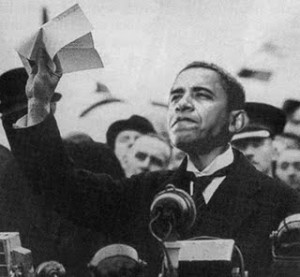![]()
Wed, August 21, 2013 | RubinReports | By Barry Rubin
In 1848, the new Communist movement issued a manifesto. It began with the opening line:
“A specter is haunting Europe — the specter of Communism.”
For our purposes today, this threat might be reworded as:
“A specter is haunting the Middle East — the specter of America.”
For example, about a year ago Dubai’s police chief addressed a major international Gulf Arab security conference. He said that there were about three dozen security threats to the Gulf Arab countries. But this well-respected security expert said the number-one threat was the United States.
Since that time, this American specter has become vivid. For instance, The New York Times had a recent editorial which stated that the only protection for Egypt’s democracy — meaning Muslim Brotherhood participation in the next Egyptian government — was the United States and Europe. The Egyptian regime, Israel, and Saudi Arabia and the Gulf Arab states were bad for wanting to protect their societies from Islamic ideology, revolution, and anti-Western Sharia states!
Might the United States and its allies rather be expected to battle Turkey, Iran, Hamas, Hizballah, Tunisia, Bahrain, and Hamas or otherwise might it support Islamists while Saudi Arabia fought Europe’s and America’s response as too soft on Hizballah?
But what if a crazy notion seizes policymakers, blessed with the mush of ignorance about the Middle East, that they can take control of the troublemakers? Perhaps Germany (World War One and Two jihads), or the Soviet control of radical nationalist regimes in the 1950s and 1960, or the French rescue of the Palestinian leadership in the late 1940s, or Ayatollah Ruhollah Khomeini in Iran during the 1970s, or America in the 1950s (Arab nationalism), or the 2010 Muslim Brotherhood would turn nominal extremists into friends?
Imagine, dunderheads in Washington, London, Paris, and so on thinking they are masterfully preserving stability, making peace, and harnessing Sharia in the cause of boosting democracy!
How smug would be the smiles when those who perpetrated September 11, 2001, were supposedly defeated by those mentored into power a decade later by the West in Benghazi on September 11, 2012, or in the Arab Spring or the Syrian revolution!
Look at it through the eyes of the Arabs, Iranians, Turks, Kurds, and Israelis who think they will try to impose a new order the region.
Consider a famous speech by Winston Churchill at Fulton, Missouri, on March 5, 1946. In contrast to the Communist Manifesto, 100 years earlier, Churchill began, “From Stettin in the Baltic to Trieste in the Adriatic, an Iron Curtain is descended across the continent.” It might be strange that these two statements are compared to the current situation in the Middle East. But actually, they make a lot of sense.
The intention of great powers seemed to impose one (European) system on the region. In the first case, it was Communism. In Churchill’s case, it was anti-Communism he advocated, which in parallel would be Anti-Islamism.
But today, what is the system that Arabs, Iranians, Turks, and Israelis think they will try to impose on the region? The answer for those who have been watching in recent years is revolutionary Islamism.
It might seem strange that this is the thinking, but it isn’t. The question is whether there is a system that Western Europeans want to impose. And the answer is that to the Arabs and others in the region — although this does not mean it has to be true — since the 1979 Iranian revolution, they have supported radical Islamism. In fact, it should be understood that after the Arab Spring, Arabs did not generally identify Western interests with support for moderate democracy, but with support for Islamism.
Incidentally, Churchill’s title was “The Sinews of Strength,” and he favored a policy of leading a coalition of the Free World, which would be welcome today.
To summarize, in the 1930s, Churchill favored anti-fascism and advocated a united front against Nazi Germany. After World War Two, he supported an alliance of the Free World against the Iron Curtain.
Where is the Churchill of today?
Well, directly his bust was quickly chucked from the White House because he was the symbol for Obama of Western colonialism.
Who was the genuine symbol of anti-colonialism for Obama? The left wing anti-Western revolutionary ideological movement represented by the Muslim Brotherhood or Chavez, and other demagogues.
If you favor Islamism, you cannot be accused of Islamophobia, a U.S.-sponsored movement except for the extremists of al-Qaida. Not liberals or real pro-democrats or conservative traditionalists or nationalists or communal nationalists, but Islamists.
That also means that non-Islamists can also be the enemy in Western eyes. Moderates are actually less desirable friends to terrorists and extremists. The West seems to view its three main threats as Egypt, Saudi Arabia, and Israel; its three main friends as Turkey, the Muslim Brotherhood, and the Syrian Islamist rebels.
Consider this: In Egypt, Tunisia, Syria, Turkey, and other countries, Western powers and especially America were seen to be behind Islamist governments. And in the Gaza Strip, Lebanon, and even Iran, they were portrayed in this way with perhaps somewhat less justice. But here is the bottom line: the overwhelming majority of Arab governments and the Turkish-Iranian democratic opposition had many reasons to think that the Western countries, and especially the United States, were actually supporting their Islamist foes. In 2013, that view became even more accurate.
It should be understood in the current regional picture that the Western world, and especially the Obama Administration, have taken the Islamists’ side in the battle between these forces.
Barry Rubin is director of the Global Research in International Affairs (GLORIA) Center and editor of the Middle East Review of International Affairs (MERIA) Journal. His next book, “Nazis, Islamists and the Making of the Modern Middle East,” written with Wolfgang G. Schwanitz, will be published by Yale University Press in January 2014. His latest book is “Israel: An Introduction,” also published by Yale. Thirteen of his books can be read and downloaded for free at the website of the GLORIA Center including “The Arab States and the Palestine Conflict,” “The Long War for Freedom: The Arab Struggle for Democracy in the Middle East” and “The Truth About Syria.” His blog is Rubin Reports. His original articles are published at PJMedia.



 RSS
RSS











[…] See introduction, Obama Middle East policy, the second term: “ part 1 — Why U.S. Policy Betrayed the Moderates“. […]